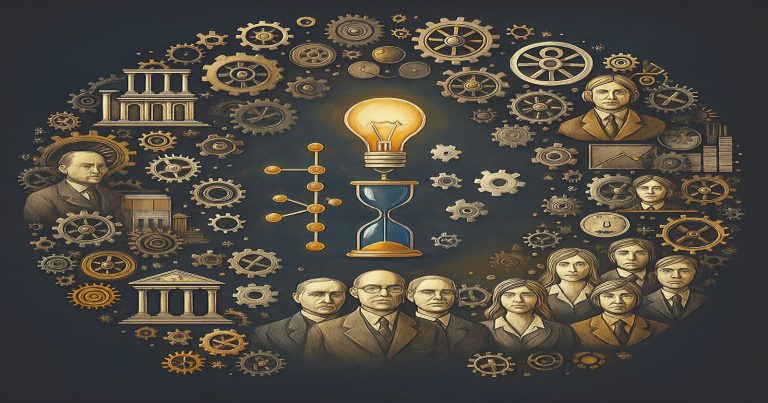The evolution of management thought is how management ideas and practices developed through history to shape today’s workplace. From early classical theories to modern systems and behavioural approaches, each phase added depth to the understanding of managing people, processes, and performance. This historical growth reflects the changing needs of industries and societies. By studying this subject, students and professionals can discuss the evolution of management thought and learn how management has evolved to become more people-oriented, flexible, and data-driven.
What Does Management Thought Mean?
Management thought can be described as the body of ideas, theories, and principles formulated for the purposes of improving the operation of an organisation. These ideas guide how managers plan, lead, organise, and control resources for the efficient attainment of goals. To understand the management strategies of today, it is important to explain the evolution of management thought from its early history down to present-day applications.
Understanding the Core Idea
The evolution of management thought has produced varied schools—from strict rule-based classical theories to modern flexible systems that consider human emotions, creativity, and external forces.
- It offers a foundation to understand modern management functions.
- It helps managers make informed decisions and manage teams well.
- It supports organisational goals through structured methods.
The Concept of Evolution of Management Thought
The evolution of management thought shows how theories changed over time based on industrial needs and social conditions. Management as a field didn’t emerge overnight; it went through stages, each contributing new perspectives and practices.
Historical Stages of Management Evolution
This journey helps discuss the evolution of management thought by linking workplace changes with the theories created to manage those changes better.
- Early Management: Focused on trade, supervision, and simple division of labour during ancient civilisations.
- Classical Approach: Introduced systematic principles during the industrial era.
- Human Relations Movement: Brought attention to emotions, relationships, and motivation.
- Quantitative Approach: Added mathematical modelling to decision-making.
- Modern Approaches: Focus on systems thinking, technology, and adaptability.
Five Management Evolutions
These five primary stages show how management thought evolved from rigid task systems to human-centred and flexible approaches. When we explain the evolution of management thought, these phases form the core narrative of that transition.
Scientific Management (Early 1900s)
- Key Thinker: Frederick W. Taylor
- Focus: Work efficiency using time studies, standardised tasks, and incentives
- Impact: Encouraged productivity through precise task breakdowns
- Example: Assembly line work in manufacturing industries
Administrative Management
- Key Thinker: Henri Fayol
- Focus: Managerial roles and principles like planning, organising, and controlling
- Impact: Helped managers structure organisations
- Example: Using Fayol’s 14 principles for smoother operations
Bureaucratic Management
- Key Thinker: Max Weber
- Focus: Formal rules, hierarchy, and job roles
- Impact: Created clarity in large organisations
- Example: Government departments with defined chains of command
Human Relations Movement
- Key Thinker: Elton Mayo
- Focus: Employee motivation and group dynamics
- Impact: Recognised the social needs of workers
- Example: Better productivity through improved working conditions
Contingency Approach
- Key Thinker: Fred Fiedler
- Focus: Management depends on the situation and environment
- Impact: Flexibility in leadership style
- Example: Different approaches for creative vs. crisis teams
These phases reflect how organisations had to change and discuss the evolution of management thought over time.
Classical Approach
The classical approach focused on improving productivity and efficiency. It laid the foundation for many modern theories by introducing structure and scientific analysis. This approach remains essential when we explain the evolution of management thought in academic and professional studies.
Key Elements of Classical Management
The classical management approach makes organisations more effective and efficient through structure, rules, and work specialisation. It includes the principal theories upon which modern managerial practices were built.
Scientific Management
- Focus: Task optimisation using data and studies
- Thinkers: Frederick Taylor, Frank and Lillian Gilbreth
- Method: Time-motion studies, clear job roles
- Example: Factory workers trained to perform one step quickly
Administrative Management
- Focus: Broad management principles
- Thinker: Henri Fayol
- Principles: Unity of command, scalar chain, discipline
- Example: Use of Fayol’s rules to guide managers in all industries
Bureaucratic Management
- Focus: Authority, discipline, and structure
- Thinker: Max Weber
- Traits: Formal hierarchy, rule-based decision making
- Example: Using clear job descriptions in public sector offices
Criticisms of the Classical Approach
Despite its limitations, this school of thought helps students discuss the evolution of management thought by providing a historical benchmark for management practice.
- Ignored the emotional and social needs of employees
- Top-down leadership discouraged creativity.
- Over-reliance on structure limits flexibility
Modern Management Approach
Modern management blends technology, flexibility, employee satisfaction, and environmental adaptation to run organisations in today’s complex world. It is the final phase when we explain the evolution of management thought and compare past rigid systems to today’s adaptable models.
Key Theories in the Modern Approach
These ideas are central when discussing management thought’s evolution in modern-day education and corporate practices.
Systems Theory
- Concept: Organisation as an open system
- Impact: All parts are interdependent
- Example: Marketing, sales, and production must align for success
Contingency Theory
- Concept: The best management style varies with the situation
- Impact: Promotes adaptive strategies
- Example: Leader using different styles for technical vs. sales teams
Total Quality Management (TQM)
- Concept: Quality across processes and participation
- Impact: Customer satisfaction and employee involvement
- Example: Toyota’s Kaizen method using feedback loops
Behavioural Science Approach
- Concept: Importance of motivation, teamwork, and communication
- Impact: Creates engaging and human-centric workspaces
- Example: Google’s flexible work culture and innovation labs
Evolution of Management Thought FAQs
1. What is the meaning of the evolution of management thought?
It refers to how management ideas and practices have developed based on societal and business needs.
2. Who introduced scientific management?
Frederick W. Taylor developed scientific management to improve task efficiency using time-motion studies.
3. How does the human relations movement differ from classical management?
Greater output from the employees arises due to improvement in the workers’ welfare, motivation, and collaboration, and not just on formation and productivity.
4. What is the importance of contingency theory?
It shows that management decisions must adapt based on the situation, making it a key part of modern thought.
5. How can students discuss the evolution of management thought effectively?
They should focus on key phases—from classical to modern approaches—using examples, thinkers, and business needs that influenced those changes.


